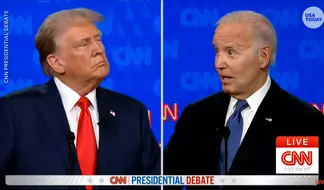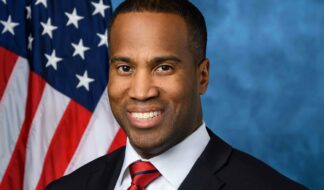BY CHRIS CRAIN
Viewpoint
"Change has come to America." With those electric words, Barack Obama embraced his landslide election as the nation's first-ever African American president. The soaring and inclusive rhetoric that inspired the support of so many, especially young voters, was on full display in Chicago's Grant Park on Tuesday.
Just as in the 2004 keynote address to the Democratic convention that launched him as a national political figure, and just as he had throughout the primaries and general election, the brand new president-elect expressly included "gays and straights" as among the groups of Americans whose divisions he sought to unite.
Certainly, gay voters were united behind Barack Obama. Even though the Log Cabin Republicans endorsed John McCain and Sarah Palin as examples of "a different kind of Republican," exit polls showed only 25 percent of gay, lesbian and bisexual voters went for the Republicans. That's the same percentage George W. Bush received four years ago despite a snub by Log Cabin over his support for a federal marriage amendment.
When President Obama takes the oath of office in January, he will do so with a record of support for GLBT rights that eclipses that of any serious national candidate before him, including John Kerry in 2004, and including even Hillary Clinton and the other Democrats that Obama defeated this year during the primaries.
But along with the euphoria felt by many that Obama had transcended old divisions and united the country, there were sobering and painful reminders of ugly divisions based on sexual orientation that persist and grow deeper.
In John McCain's home state of Arizona, where just two years ago voters rejected an expansive ban on recognition for same-sex couples, a more limited constitutional amendment banning gays from marrying passed easily.
In Florida, even without the support of Republican Gov. Charlie Crist, voters overwhelmingly supported an amendment banning gay marriage, though state law already prohibits same-sex unions. Florida is also the only state that prohibits gays from adopting children, and on Tuesday voters in Arkansas, where I was born, backed a ban on adoption and foster parenting by adults "cohabitating outside of marriage," meaning gays or straights in unmarried relationships.
At least in Connecticut, where the state supreme court last month ruled in favor of gay marriage, voters rejected a constitutional convention that would have opened up the possibility of an amendment overturning that court victory.
Most devastating, of course, were the results out of California, where voters cruelly took back the newly minted right to marry won just six months earlier in a landmark state supreme court ruling. For a slim majority, apparently, months worth of images of happy gay couples tying the knot weren't enough.
Fully 81 percent of California Republicans ignored the opposition of Gov. Arnold Schwarzenegger and voted in favor of Proposition 8. Paradoxically, so did one-third of Obama's supporters, and 70 percent of African-American voters. In Florida, more than 40 percent of Obama voters backed the gay marriage ban, along with 71 percent of black voters and two-thirds of Latinos.
These defeats were especially heartbreaking since they came the same day, and even at the hands of the same voters, who had simultaneously ushered in such historic progress. If nothing else, the decidedly mixed results should signal something an important change in priorities is required among those gay activists who will work with the Obama administration and a strengthened Democratic congressional leadership.
Tuesday's results remind us that throughout this country and even in progressive places like California, gays still face the refusal by their government to recognize their relationships — in many cases their discriminatory, second-class citizenship is even written into state constitutions.
Relationship recognition has emerged as a federal issue far more important, affecting exponentially more of us, than low-hanging legislative fruit like workplace protections and hate crimes — and even the "Don't Ask, Don't Tell" policy on gays in the military.
There's no time or political capital to waste on these narrow, limited measures. It's politically unlikely the Democrats will ever enjoy a stronger majority in the House, and they may well be at their peak in the Senate. President-elect Obama will take office with a popular mandate unlike any since Ronald Reagan in 1980.
The time is now to see Congress and the president to take decisive action on the core of the gay rights movement – eliminating official discrimination against GLBT Americans. That means making sure Obama follows through on the positions he embraced as a candidate:
* Repealing of the federal Defense of Marriage Act, at least the portion that blocks federal recognition of marriage licenses issued by states like Massachusetts, California (at least for now), and Connecticut (as of next week).
* Extending marriage-like federal recognition to same-sex couples in civil unions (in states that offer them), or who can otherwise demonstrate an enduring, long-term commitment.
* Passing the Uniting American Families Act, extending to gay Americans the same right to sponsor foreign partners for citizenship that heterosexual citizens enjoy.
Obama was right, of course, when he reminded us, "This victory alone is not the change we seek. It is only the chance for us to make that change." For those who care about taking full advantage of this historic moment to bring real equality for GLBT Americans, relationship recognition is the kind of "change" we need to believe in.









